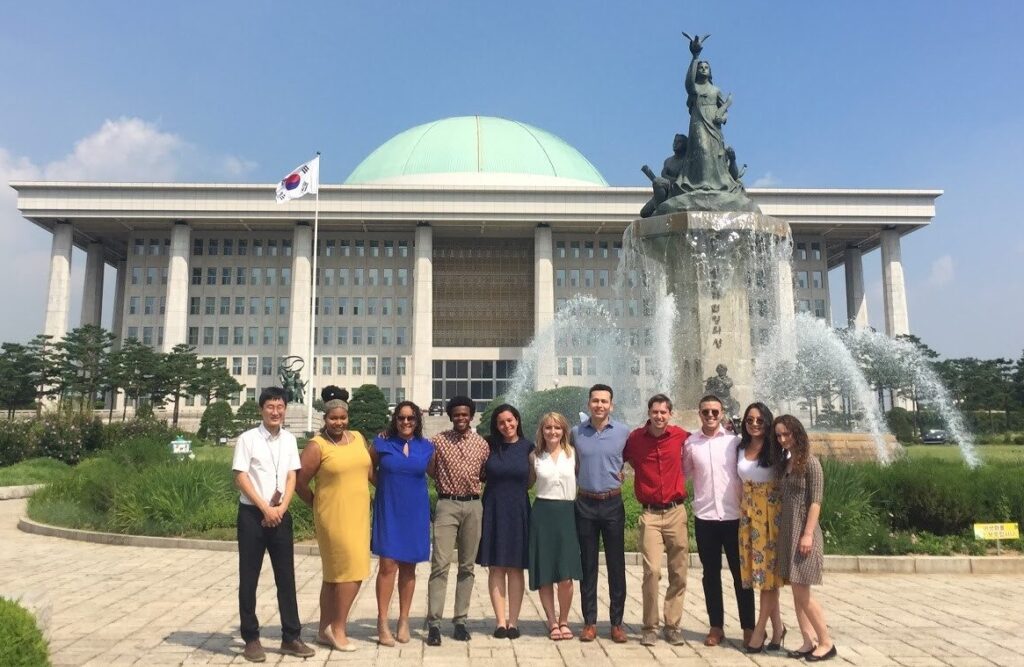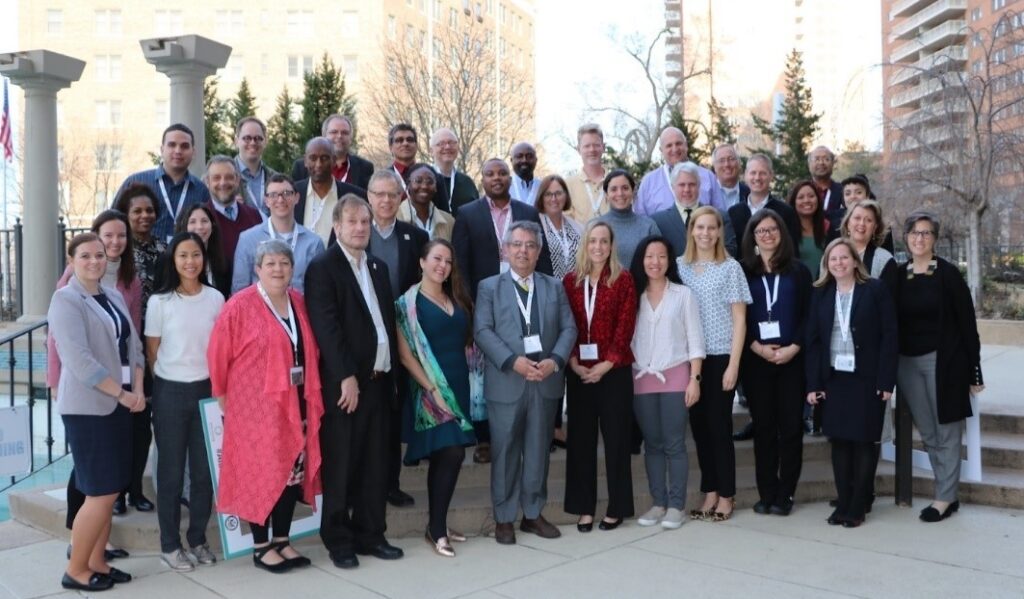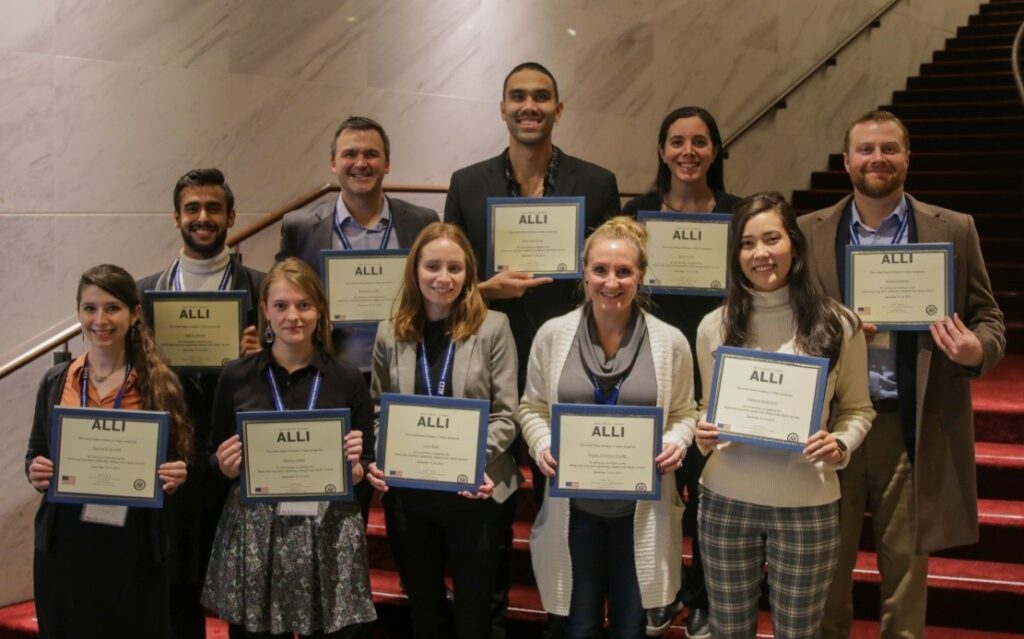Jarrett Fisher, and alumni of the U.S Congress – Republic of Korea National Assembly Exchange Program, shared with us the following article written to reflect her continued engagement with the broader Exchange Alumni community – the State Department’s alumni program. Jared was a participant in the 2018 U.S Congress – Republic of Korea National Assembly Exchange Program which is jointly funded by the U.S. Department of State’s Bureau of Educational and Cultural Affairs and the Republic of Korea National Assembly. This unique program is designed to broaden the perspectives of Korean and American young people on the legislative process; the history of U.S. – Korean relations; and current economic, political, and security aspects of the bilateral relationship. The program also provides the 10 American and 10 Korean young leaders with firsthand experience of each other’s people and culture and creates opportunities for participants to form long-lasting personal contacts.
It is an understatement to say the United States Congress-Republic of Korea National Assembly Exchange Program was a turning point in my life. In the summer of 2018, I participated in this little-known exchange program funded by the United States Department of State and implemented by the Meridian International Center. I was interested in foreign policy before, but as a topic of conversation at the dinner table. I never knew I could make a career out of foreign policy, but after this exchange in South Korea, I felt confident in working toward a job in the international relations field.
Our exchange commenced right after the 2018 North Korea–U.S. Summit in Singapore. There was a lot of hope that a peaceful resolution to the Korean Peninsula conflict was in sight, and this narrative was a mainstay in the headlines for the duration of our exchange. It was incredible to set foot in the DMZ, which is the border between South and North Korea. We had meetings at the Ministry of Unification, Ministry of Foreign Affairs (MOFA), and Hanawon—where North Koreans go to prepare to transition into South Korean society. We even visited Pyeongchang—not to be confused with Pyongyang—where the 2018 Winter Olympics had recently been hosted.

One of my favorite aspects of the exchange program was the cultural experiences. For example, on our last night in South Korea, we went to a South Korean karaoke. It is quite different than karaoke in the United States; in South Korea, you rent a “noraebang,” which is a private room large enough for 15-20 people. My absolute favorite was trying many different foods in South Korea including barbeque, hot pot, teok-bokki (which I pronounce “toe-poke-ee”), and desserts like hotteok and bingsu.
Soon after returning to the U.S. I formally registered as a DOS International Exchange Alumni and joined this global community of over 300,000 international exchange alumni, with access to resources and additional opportunities.
Alumni TIES
As my first international exchange follow-up program, I was accepted and participated in the U.S. Alumni Thematic International Exchange Seminar (Alumni TIES) in March 2019 in Kansas City, Missouri under the topic of “Stronger American Cities: Closing the Skills Gap and Building Entrepreneurial Ecosystems.” I had the privilege of joining American alumni from dozens of different exchange programs, who work in a variety of industries, of all different ages. This experience was equally as life-changing as my original exchange program.
Prior to the kickoff of the programming, we attended an event called Road to Global Entrepreneurship Summit (GES) Heartland. GES is organized annually by the DOS and brings together entrepreneurs from all over the world. We heard from both Secretary of State Mike Pompeo and then-Small Business Administrator Linda McMahon.

Across the Alumni TIES experience, we also heard from other leaders in the State Department, entrepreneurs, and even our peers who spoke on panels and led workshops for our alumni cohort. The site visits were the best part of the program, with my favorite site being to the Ewing Marion Kauffman Foundation, which is the largest non-profit organization in Kansas City. The inspirational individual for whom the foundation is named went to community college, raised $5,000 to start a pharmaceutical company, and eventually sold his company for $6 billion. When Mr. Kauffman sold his company, he rewarded his loyal employees by making 7,000 of them millionaires, which dramatically helped Kansas City overall.
ALLI Indo–Pacific Summit
In 2019, I was selected for another opportunity for exchange alumni organized by the U.S. Embassy in Tokyo, facilitated by Cultural Vistas, called the Advancing Long-term Leadership Initiative (ALLI) Indo-Pacific Summit. I joined 40 young international exchange alumni from countries within the Indo-Pacific region for this convening. One of the most enjoyable aspects of the Summit was a cultural exchange between the participants called “omiyage.” We all brought snacks from our home countries, enough for all of our peers, then presented our snack and explained why it represents part of our national culture. As an American delegation, we brought Fruit By The Foot, and even engaged in a live Fruit By The Foot contest, which involved participants competing to eat the snack the fastest without using their hands.
During the Summit, we had beneficial breakout sessions and workshops on best practices for community engagement, sustainability, public-private partnerships, disaster resiliency, cross-border collaboration, and entrepreneurship. At the end of the Summit, we were split into multi-country groups of three or four and had several hours to put together a pitch for a project that advances the Indo-Pacific identity. Our closing activity was presenting our pitches to staff from the U.S. Embassy, where we also found out that we were able to apply for small grants from the Department of State to turn our ideas into reality.
Small Grant Recipient: Indo-Pacific Youth Dialogue

After returning, my teammates and I decided to further develop our project proposal and apply for the small grant, to make this project a reality. My two wonderful teammates, Yan Qi Chiang from Singapore and Loi Nguyen from Vietnam, and I were guided by our mentor Nicholas Eng from Singapore to complete the grant application. In February 2020, we were notified that the U.S. Embassy in Tokyo had selected our project for funding.
Our project is called the Indo-Pacific Youth Dialogue (IPYD). It will be a three-day policy workshop for young leaders from the Indo-Pacific region, in conjunction with the twice-yearly ASEAN (Association of Southeast Asian Nations) Summit. We have decided to focus our event on six main policy areas:
- Climate change and natural disaster risk management
- Digital society and the Internet
- Entrepreneurship and jobs for youth
- Public health preparedness
- Religious tolerance, countering violent extremism, and peacebuilding
- Security and transnational crime
Every year, the Chair of member nations of ASEAN rotate which country serves as Chair. The Chair country hosts two ASEAN Summits, as well as other Ministerial-level meetings throughout their host year. In 2020, Vietnam is the ASEAN Chair. Originally, our workshop was scheduled to take place directly before the 36th ASEAN Summit in Vietnam in April, however, as I write this post, coronavirus is still developing globally. Thankfully, the DOS has offered an extension of the grant. We now plan to host IPYD in late summer 2020 in Hanoi, Vietnam, in advance of the 37th ASEAN Summit and 15th East Asia Summit. Our key output will be a Youth Policy Communique that the participants will collaborate to author and present to leaders of the Indo-Pacific countries. Crafting the Youth Policy Communique will be an exercise for young leaders to practice being solutions-oriented, and learn the steps of solving issues in their communities and countries through policy. The goals of our project are to promote youth involvement in governance and spread awareness about the Indo-Pacific as a unique and consequential regional bloc. As a team, we express our gratitude to the Department of State for the opportunity to design and implement our own exchange program for young leaders after having benefited from State Department Exchange Programs ourselves.















